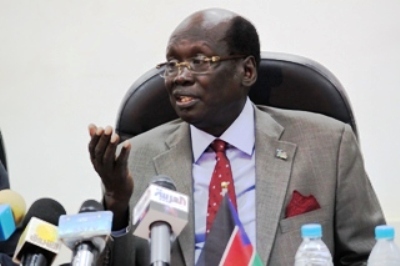Juba says “peace enemies” sabotaging Khartoum relations
April 19, 2014 (JUBA) – South Sudan’s government on Saturday accused “enemies” of peace and regional stability of sabotaging its improving relations with the government of neigbouring Sudan, asserting it remains committed to respecting the terms of the Cooperation Agreement the two sides signed in 2012.

Marial’s comments come after the Sudan Armed Forces (SAF) dismissed claims by the spokesperson of the South Sudanese army that rebels led by former vice-president Riek Machar are being trained at camps inside Sudan.
In a statement released from Khartoum, SAF’s spokesperson, Al-Sawarmi Khalid Saad, described the allegations as “false and unfounded”.
Saad stressed that Sudan had no intention of interfering in the domestic affairs of its southern neighbour and would continue to maintain a neutral position on the conflict.
Philip Aguer, the spokesman for the South Sudanese army (SPLA), was quoted as making the accusation – that rebel troops that attacked Unity state capital Bentiu this week were trained inside Sudan – in the London-based Asharq Alawsat newspaper on Tuesday.
“What we know now is that Machar forces received training inside Sudanese territory and under the supervision of the government army,” he said.
The South Sudanese government admitted on Tuesday that rebel forces are in full control of Bentiu and that its troops had withdrawn following heavy clashes over the weekend.
Aguer told Asharq Alawsat that South Sudanese rebels are present in the Heglig and Kharsana areas in West Kordofan state. He add that the SPLA would respond militarily, but it was up to the Juba administration to take appropriate political measures to address the issue.
Earlier this month, South Sudan accused Sudan of attacking its oil-rich border regions where government forces loyal to president Salva Kiir are battling pro-Machar rebels.
Having come close to returning to all out conflict in the April 2012 over disputes over oil transit fees and border issues, South Sudan and Sudan signed an agreement in September 2012 to work together to resolve all the issues relating to South Sudan’s secession from Sudan in July 2011.
“This was what we have agreed before the international community. There are mechanisms which could be used to address issues where misunderstanding arises” Marial said.
He however said some unnamed people “would like to spoil these improving relations between the two countries. They have realised their interests would not continue, if the peace is achieved, so they want to once again cause mistrust.”
Marial, a close ally of President Kiir, told Sudan Tribune on Saturday that his country would continue to respect the terms of the cooperation agreement, stressing that war between the two countries would destabilise the entire region.
Sudan has been fighting a civil war in Darfur since 2003. After South Sudan’s independence in 2011 as part of a peace deal ending decades of civil war conflicts began north of the new border in South Kordofan and Blue Nile. In both states many had fought with the rebel movement that is now South Sudan’s ruling party (SPLM) and army (SPLA).
Since December, a split in the SPLM and SPLA has plunged South Sudan into its own civil conflict leaving over one million people displaced.
“The spoilers of peace and stability might want to cause this developing situation. What is happening at the border might be the work of individuals wanting to cause mistrust and spoil the confidence which have been built by the cooperation agreement for their own interests”, Marial said.
South Sudan’s top diplomat, who repeatedly avoided accusing Sudanese government of participating in the attack on Bentiu, said his government was in contact with the government of Sudan to resolve the differences through established mechanisms.
“There are discussions between the two governments to try to resolve this. The heads of the security from both countries are in contact. Our minister of defence is discussing with the Sudanese defence minister the way forward. The security arrangement is the basis of discussions. It is one of the mechanisms which can be used to resolve any misunderstanding relating to border issues”, Marial explained.
(ST)
